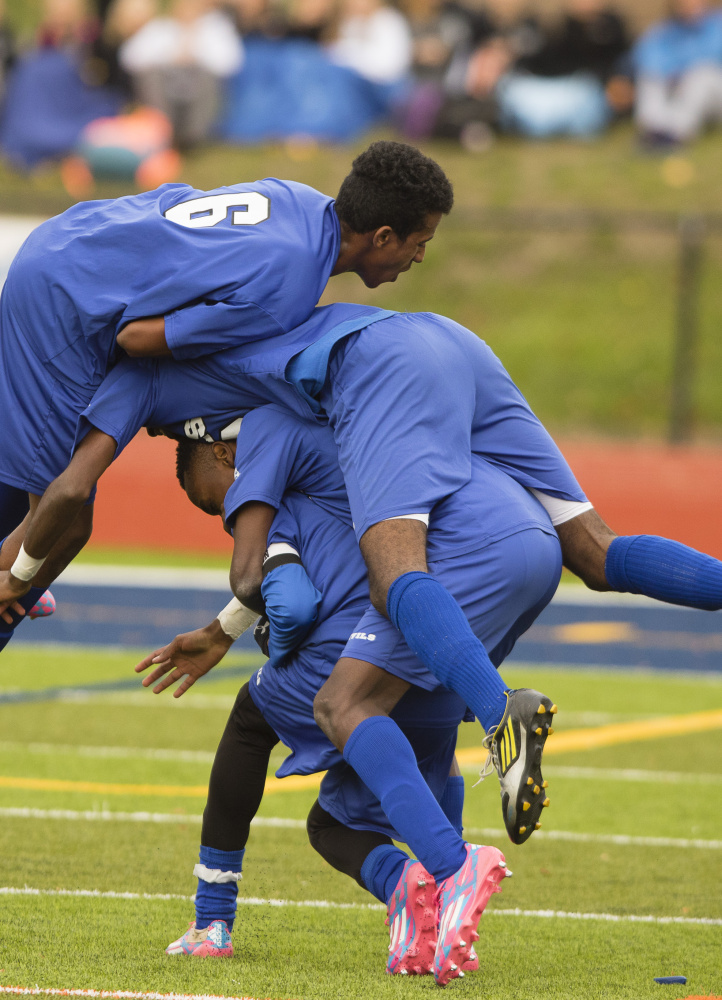WATERVILLE — The Class A boys’ soccer championship Nov. 7 brought Lewiston High School, in a tough game against Scarborough High School, its first ever boys’ soccer state title.
Local news articles about the game highlighted the extraordinary achievements of the Lewiston team, led by a dedicated coach in his 33rd year of coaching who fielded a team largely composed of immigrant boys.
News coverage quite rightly lauded coach Mike McGraw’s ability to cohere a stellar multinational team of boys born in Somalia, the Democratic Republic of the Congo, Turkey, the United States and elsewhere.
This is a story of epic significance not only for the coach, the players and their families, but also for Maine – and because it shows the lie in the anti-immigrant argument that immigration weakens our national fabric and challenges our cultural integrity.
While giving Coach McGraw the enormous credit he deserves, it is also important to acknowledge a back-story about how some of those boys earned a place on the team and what they brought with them to the team from their own life experiences.
Eight of the boys spent their early years in the same refugee camp in Kenya. When they arrived in Lewiston, few had access to organized sports. Some families couldn’t afford the fees charged by existing programs, and some parents were unfamiliar with the system of organized sports in the United States.
Many of the older boys from refugee immigrant families who enrolled in English as a Second Language/English Language Learner high school classes were ineligible to play on school teams until they accrued a certain number of credits toward graduation.
Recognizing that soccer offered a vehicle for building community solidarity, nurturing personal development and creating joy, adults in Lewiston’s immigrant community created free soccer programs to help their boys focus on something they loved and excelled at while they worked hard to adjust to life in Lewiston. The chasm between life in a Kenyan refugee camp and life in Lewiston cannot be overstated.
A community-based organization founded in 2006, the Somali Bantu Mutual Assistance Association, recognized that soccer might be a savior for older boys who loved soccer but lacked access to local teams and created a league to train them.
Another community-based organization founded in 2008, Maine Immigrant and Refugee Services (formerly the Somali Bantu Youth Association), followed suit by creating a soccer program for younger boys in refugee-immigrant families who were also being left out of the system of organized sports.
Their program motivated young boys, trained them in discipline and teamwork and gave them a space where they could succeed, develop self-confidence and feel proud of their accomplishments.
Many of the coaches and role models for the younger boys were the young men who played in the young adult league created by the Somali Bantu Mutual Assistance Association. Maine Immigrant and Refugee Services now enrolls more than 300 children every summer. The L/A Islamic Center runs yet another youth soccer program, ensuring a robust schedule of organized games among the teams in the leagues.
These soccer programs – free to anyone who wants to join – are community efforts in the collective mentoring and training of boys, heavily dependent on the volunteer hours of immigrant adults who serve as coaches, organizers, mentors, referees, teachers, cooks and hosts for visiting teams.
When the organizations struggle to get access to playing fields, community members pool resources to rent fields to make sure their kids can practice.
They drive them all over New England to play other immigrant community-organized leagues. They apply for grants from private foundations to buy nets, balls and pinnies for their players.
What I saw on that field at Fitzpatrick Stadium in Portland during the championship game was, in addition to the hard work of Coach McGraw, also the hard work of many of the people in the stands – parents, older brothers, cousins, uncles, neighbors – who gave their afternoons and weekends to mentoring those kids, to teaching them not only soccer techniques but also community cultural values that they brought with them from their countries of origin, like mutual respect, unselfishness on the field, reciprocity, discipline and the central importance of working together and relying on each other.
The Class A boys’ soccer state title is Coach McGraw’s victory, it is the players’ victory, it is the high school’s victory and it is the city of Lewiston’s victory. But it is also the victory of the immigrant community members who modeled for the boys how to give selflessly, how to take care of each other and that supporting each other is the only way to survive.
Send questions/comments to the editors.


